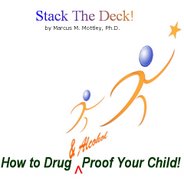Drug Prevention for Parents by Dr. Marcus M. Mottley has just been released.
Its major focus is on how parents can "Drug and Alcohol Proof their Children".
It gives parents and others tons (not ounces... not even pounds...) of information about how to prevent teenage drug use. An “ounce” of prevention used to get you a “pound” of cure! Not anymore! These days with all the powerful negative risk factors that are aligned against children, parents need “tons” of prevention to get even one little “ounce” of cure.
Parents who read and use "Drug Prevention for Parents" are informed and feel empowered as they take steps to protect their children, keep them safe and drug free and help them become more resilient! Children and teens achieve improved academic scores, enhanced social and communication skills, better decision-making, and become more focused and goal oriented.
If you are a teacher, counselor, school administrator, social worker or other professional... can you use this information to work with parents and children? The answer is absolutely yes! "Drug Prevention for Parents" can be used as a core manual for school and community-based drug prevention programs.
For those parents with teenagers who have already started to use drugs... you need to focus on intervention and possibly, treatment. The great thing about Drug and Alcohol Proof Your Child is the techniques, strategies and prevention methods it presents can also be used as an adjunct to drug abuse intervention, relapse prevention, and some aspects of treatment to build teenagers’ social, emotive and cognitive skills.
You can get "Drug Information for Parents" here at Amazon.com or at Prevent-Drug-Abuse.com
For more information visit Prevent-Drug-Abuse.com
For more information visit Prevent-Drug-Abuse.com

